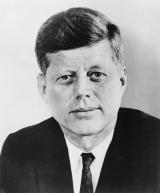Kto umawiał się z Judith Exner?
Sam Giancana umawiał się z Judith Exner od ? do ?. roku Różnica wieku wynosiła 25 lata, 6 miesięcy i 27 dni.
John F. Kennedy umawiał się z Judith Exner od ? do ?. roku Różnica wieku wynosiła 16 lata, 7 miesięcy i 13 dni.
Frank Sinatra umawiał się z Judith Exner od ? do ?. roku Różnica wieku wynosiła 18 lata, 0 miesięcy i 30 dni.
Judith Exner
Judith Exner (January 11, 1934 – September 24, 1999) was an American woman who claimed to be a mistress of U.S. Senator, then U.S. president John F. Kennedy and Mafia leaders Sam Giancana and John Roselli. Some aspects of her claim of having known Kennedy have been verified by documents, phone records, and testimony. She was also known as Judith Campbell Exner, and Judith Campbell.
Czytaj więcej...Sam Giancana

Sam „Momo” Giancana vel Salvatore Giancana (ur. 15 czerwca 1908, zm. 19 czerwca 1975) – jeden z najważniejszych bossów mafii chicagowskiej, której był szefem w latach 1957–1966.
Czytaj więcej...Judith Exner
John F. Kennedy

John Fitzgerald Kennedy, powszechnie określany inicjałami „JFK” (ur. 29 maja 1917 w Brookline, zm. 22 listopada 1963 w Dallas) – amerykański polityk, 35. prezydent Stanów Zjednoczonych (1961–1963).
Czytaj więcej...Judith Exner
Frank Sinatra

Francis Albert Sinatra (ur. 12 grudnia 1915 w Hoboken w stanie New Jersey, zm. 14 maja 1998 w Los Angeles) – amerykański piosenkarz i aktor filmowy pochodzenia włoskiego, ze względu na swój status popularnie nazywany „The Voice”. Jego muzyka jest uznawana za ponadczasową, zaś on sam za najwybitniejszego amerykańskiego piosenkarza XX wieku. Szacowany nakład ze sprzedaży wszystkich jego wydawnictw na całym świecie wynosi ponad 150 milionów egzemplarzy, co czyni go jednym z artystów z największą liczbą sprzedanych albumów muzycznych w dziejach.
Karierę muzyczną rozpoczął w drugiej połowie lat 30. XX wieku od współpracy z Harrym Jamesem i Tommym Dorseyem. W 1943 podpisał kontrakt z Columbia Records i rozpoczął solową karierę i wkrótce stał się idolem bobby soxers. Był pierwszym amerykańskim piosenkarzem, który śpiewał nie tylko dla dorosłych, ale zdobył popularność wśród nastolatków. Wystąpił w kasowym musicalu Podnieść kotwicę (1945) i otrzymał Oscara honorowego za występ w filmie krótkometrażowym The House I Live In (1946). Na rynku fonograficznym zadebiutował w 1946 albumem studyjnym pt. The Voice of Frank Sinatra. Na przełomie lat 40. i 50. przeżywał okres kryzysu w karierze. Powrócił na szczyty popularności po zdobyciu Oscara dla najlepszego aktora drugoplanowego i Złotego Globu za rolę w filmie Stąd do wieczności (1953). Do końca lat 50. XX wieku wydał kilka albumów, które osiągnęły sukces komercyjny: In the Wee Small Hours (1955), Songs for Swingin’ Lovers! (1956), Come Fly with Me (1958), Only the Lonely (1958) i Nice ’n’ Easy (1960).
Czytaj więcej...